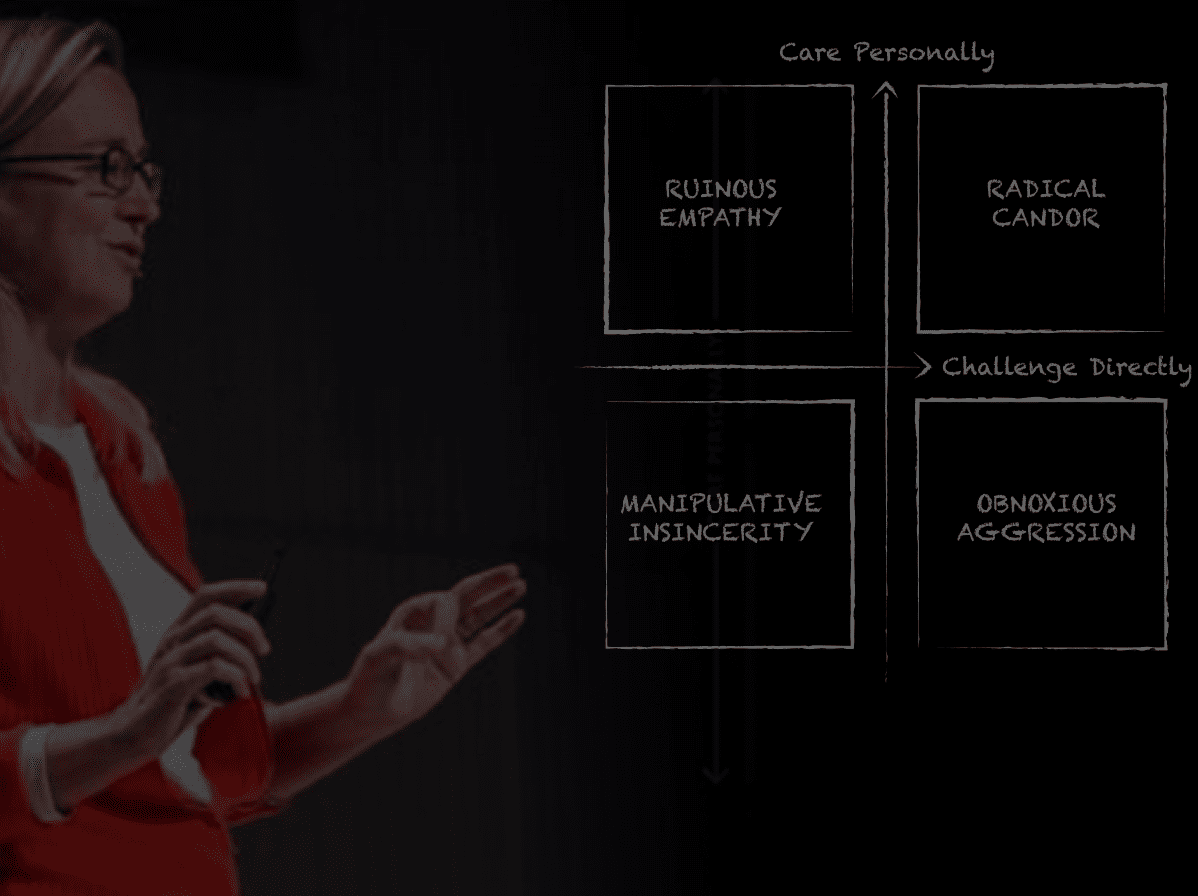Now You Can Talk Radical Candor 24/7 With the Kim Scott Portrait
Kim Scott is the author of Radical Candor: Be a Kick-Ass Boss Without Losing Your Humanity and Radical Respect: How to Work Together Better and...
4 min read
Kim Scott Jun 19, 2020 2:28:11 PM

There’s no manual for how to lead your team through a pandemic like COVID-19. Most people in the workforce today have never lived through a global crisis of this magnitude, so it can be difficult to know what you’re getting right and what you’re getting wrong.
While there’s a lot we don’t know, there are a few things we know for sure:
In my coaching sessions with Cameron Yarbrough, CEO of the leadership coaching platform Torch, we've talked about these attributes as tools for managing through a downturn. Cameron recently told me that he’s aware it’s particularly risky during a crisis to allow negative feelings to be unexpressed. This is why he’s committed to asking his team to give him direct feedback.
Like so many leaders, Cameron has had to take a hard look at things, asking, even as an early-stage startup, "What would it take for Torch to become profitable?" Cameron showed real compassion for his team as they went through that process together. He was kind but clear about what it meant, and he acted quickly. This helped him strike a balance between being compassionate and doing what needs to be done to keep the company moving forward.
If you’re a leader navigating a similar situation, you’re going to have to be persistent to get people to be candid. Feedback conversations often trigger our stress response, and this can be exacerbated when it is coming from someone who we perceive has higher status, like “the boss.”
It’s hard. But if you’re committed to being a true thought partner, following these three steps can help.
The simplest path to successful crisis management is often the least obvious — ask others what they think. And don’t just ask your peers; ask your team — the people who report to you — what they need to be successful. Ask how you can help. And, especially now, ask them to criticize you.
To encourage candid feedback, I like to use what I call a “go-to question.” Your go-to question should be one that requires a thoughtful response versus a yes or no answer.
Start by saying something like, “What’s something I can do to make things easier for you?” or “What’s something I am doing that’s making things more difficult for you?”
You might be met with silence. Fight the urge to speak first. Breaking through the discomfort is especially important. Count to seven and commit to allowing the other person to speak first. When it’s clear you’re not going to break the silence, the other person will speak up to fill it.
Google’s Project Oxygen, a research initiative that sought to determine the qualities of a good manager, revealed that the most effective managers show they care for their teams not only professionally, but personally as well. One of the best ways to do that is to demonstrate that you’ve truly heard what they’ve said.
Once the person starts talking, listen with the intent to understand versus respond. When they’re finished speaking, check for understanding. You can say something like, “So what I hear you saying is…” Repeat back the issues they raised, as you understand them, to ensure you’re on the same page.
Finally, you want to reward feedback in a way that’s specific and sincere. First, thank them for their criticism. If you agree with the criticism, make visible changes based on their feedback. If the change is hard or will take some time, show them you’re working toward it.
If you disagree with the criticism, try finding something they’ve said that you do agree with and point it out. Offer your full, respectful explanation of why you disagree with their other statements.
Most people are perceptive enough to pick up on non-verbal cues, even in a remote environment. This means that what you’re not saying speaks 10 times louder than what you are. Don’t wait for the ever elusive “more information” if it causes you to delay action that helps the people on your team.
If a member of your team asks you about the future of the company or whether their job is secure, and you don’t know the answer, don’t pretend you do. It’s OK to admit that you don’t have all the answers.
However, when you do have information that affects your team, commit to delivering it as soon as possible in a way that’s kind and clear.
When we were first ordered to shelter in place and all of Radical Candor’s speaking events — which account for 95% of our revenue — were cancelled, my co-founder and CEO Jason Rosoff told the entire team on a video call where the company stood. He presented several scenarios with financial projections for each one.
Lack of information often leads people to assume the worst, including me. After Jason told us where the company stood, I realized we were in a much better position than I’d thought. Having this information also motivated everyone to work together to come up with creative ways to reinvent virtually what had been primarily an in-person business.
When leaders are transparent and authentic, their teams assume good intent, which means people won’t be working out of fear. And you can’t innovate or be creative when you’re working out of fear.
Following these steps will help you create a culture of what Amy Edmondson describes as Psychological Safety, where people will feel comfortable raising important issues not only during a crisis, but every day.
We might not have all of the information we want at this moment, but each of us has a perspective that is important to share. If we can welcome the truth as our own life raft, and create a culture that connects these life rafts together, you’ll be able to navigate the waters of uncertainty together.

Kim Scott is the author of Radical Candor: Be a Kick-Ass Boss Without Losing Your Humanity and Radical Respect: How to Work Together Better and...

What’s feedback got to do with it? If it’s running a successful business or building strong relationships, effective feedback is everything. And if...

Asking employees for feedback is a powerful tool for building trust, enhancing engagement, and driving continuous improvement throughout your...